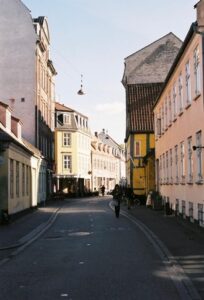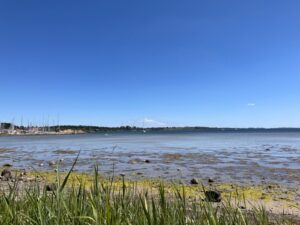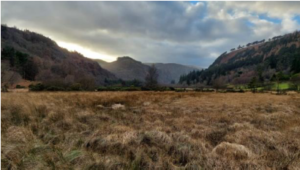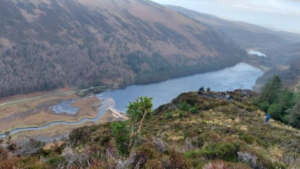Kategorie: ‘Computer Science’
Living in Madrid
- Data Science M.Sc.
- Spain, Madrid
- March 2022 – June 2022
My experiences:
Spending some time in Spain as always been on my mind, so I was really happy to finally realize it. I spent about four months in Spain and in the following I will share my experiences about living in Madrid, finding and organizing an internship and my overall personal experience.
I lived in Chueca, which (together with neighboring Malasaña) is a major destination for gastronomy and night life. On the one hand, it is great because it has a lot going on and represents diversity and LGBTIQ-friendliness. It has a central location both for walking to many parts of central Madrid as well as convenient public transport connections. On the other hand, it is expensive and did not really have a neighborhood-like feeling because it is very crowded and to my impression is really anonymous. It offers many fancy restaurants and shopping opportunities, which did not correspond too much to my preferred price segment and atmosphere though.
My favorite neighborhood is Lavapiés which is more multicultural and offers more affordable options for going out. However, accommodation there is also scarce and my recommendation for a flat would be to also consider other areas which are well connected with public transport and which have their own local atmosphere without an abundance of tourists.
As activities, I can recommend hiking and climbing in the nearby mountains. The villages of Cercedilla, El Escorial and Manzanares El Real can be reached with public transport and offer great hiking. For climbing, I was lucky to join a group of climbers of the alpine club of the Autonomous University and could profit from the good atmosphere and the carpooling within that group.
Apart from the outdoor activities and all the museums and interesting places inside Madrid, I also want to recommend doing day trips by train to the cities Toledo, Segovía and Ávila.
Finding and organizing the internship was not so easy because the planning horizons of the companies that I talked to were not clear. For example, I found a company which would have employed me, but in the end there was a shortage of projects in my desired time period. In general, the insecurity due to the pandemic situation made many companies reduce their internship activities. Moreover, I wanted to avoid a pure home office position, which ruled out some start-ups/IT-companies which do not even have office spaces anymore.
Apart from using job platforms, I eventually found my company by browsing through Madrid’s universities, their spin-offs and cooperating research and development institutes. In particular, these are more used to employ interns because in many study programs in Spain there are obligatory internships which seem to have additional funding.
However, in my case, I was the first person to come from abroad and that is why the amount of questions, uncertainties and organizational issues was relatively high. Neither to me nor to my contact person at the institution was clear at the beginning whether I would need to get a NIE (foreigner identification number) or a social security number. As my host institution could pay me a small salary, I eventually tried to obtain a NIE. This turned out very difficult because there were no appointments available at the foreign affairs office and police in Madrid. For several weeks, I checked the corresponding web page daily and could not get an appointment. Even though, I felt to have understood the system (that new appointments are entered into the system on Mondays around 12PM, still the demand by other and technical obstacles where high). In the end, I decided to travel more than 100km to the neighboring province of Ávila (as mentioned above it is a pleasant day out though) and managed to get an appointment and my document there. From then on, the procedures went relatively smoothly (apart from smaller struggles setting up a bank account).
The work itself started smoothly and I felt well-prepared from my studies and previous work experiences. The team met on two days per week in the office, the remaining days I mostly worked from my room.
I worked on data analyses and machine learning model improvements that the team had always had in mind, but could not find the time themselves for. Therefore, my work was on the one hand useful and providing insights to the time, but on the other hand always a bit separated from what the colleagues were doing. Moreover, my actual supervisor was very busy and partly away, so I was somehow not sure who to ask certain things and who decides the next steps, but I recommend to just not hesitate and ask in the group chat etc.
A peculiarity for me was that some colleagues did not have breakfast at home and that the culture of long coffee breaks (including breakfast) is imported. My colleagues worked rather long hours, but still did not let them stress too much and I appreciated to have a good and social atmosphere.
My overall experience was positive, however, it was more difficult than expected to get socially involved. This is the disadvantage of a big city and that people in my case are having their routines and private lives. In my case, sports and university associations were the solutions to get to know people. In total, I leave Madrid with some positive memories and rich in experiences, however looking forward to environments with more close people and friends.
Gaining new experience in Denmark
- Computer Science B.Sc.
- Denmark, Sønderborg
- Danfoss
- February 2022 – June 2022
My experiences:
Hi! I’m Katharina, I study Computer Science at RWTH Aachen University and I’m at the end of my Bachelor’s degree with a focus on Data Science. In the summer semester 2022, I completed a four month internship at Danfoss in Denmark.
Finding an internship
At the beginning of 2021 I was very fortunate to be chosen as participant for the UNITECH International exchange program as a representative of RWTH. The UNITECH program is a unique opportunity, which combines an academic exchange semester at one of the 8 partnering universities (incl. for instance ETH Zürich, Trinity College Dublin, Politecnico Milano) and an internship with one of the corporate partners. Therefore I spent the winter semester 2021/2022 in Lyon, France as part of the exchange and then started looking for an internship through the network around October. UNITECH arranges career fairs for us to get connected with the corporate partners. In one of these events I came in contact with a team from Danfoss in Denmark. After interviewing with several corporate partners I decided to go with Danfoss, because I very much liked their philosophy and the project description suited my profile very well. Additionally I was swayed by the conditions, as the position was compensated fairly well and accommodation was found and paid for by Danfoss. At the beginning of 2022, I had signed my contract and was looking forward to another opportunity to live and work abroad.
Formalities
Getting settled in Denmark might take some time, since there are several formalities to take care of upon your arrival and most steps include some waiting time before you can move on to the next. For any kind of official correspondance (bank accounts, getting paid by your employer, going to the doctor) you will need a NemID. This is something to take care of as soon as possible. Before you can receive the NemID, you will need to get a EU-Residence document from SIRI (apply before arrival!), a CPR number from the citizens’ centre as well as a health card (yellow card). If you reside in Denmark and are registered with a CPR number you are entitled to receive Danish health insurance. I would also recommend to contact a bank as soon as you have the health card so that they can start the process of opening a bank account for you. When these things are settled, you should be good to go. If you are planning to stay in Denmark for a long time I would recommend getting a Danish phone number in order to use the MobilePay app which is very commonly used as a payment method.
Danfoss
Danfoss is a Danish multinational company, with more than 40,043 employees globally. Danfoss was founded in 1933 by engineer Mads Clausen. Within Denmark, Danfoss is very known and is one of the biggest employers. In the south of Denmark, Danfoss has several office locations, the two biggest ones being their headquarter in Nordborg and the site in Gråsten (within Germany, the main location is in Hamburg). Nordborg is also where Mads Clausen founded the company, so many people living in the area are connected to Danfoss. The corporation is still family-owned and as an employee you can really feel their moral compass through the board’s decisions. Danfoss main market is the energy sector but their product portfolio is quite diverse, ranging from cooling & heating solutions to pumps as well as frequency converters (AC drives). From the beginning, energy efficiency has been part of Danfoss DNA, which is why their motives in terms of sustainability and decarbonization are very credible to me.
My Internship Project
I completed my internship in the Drives Intelligence department, a technology development department focused on embedded digital solutions for variable frequency drives. My project’s title was “Vibration Analysis using Machine Learning” and dealt with creating a Machine Learning solution for mechanical fault detection using signals from a variable speed drive and additional vibration sensors. My tasks included traditional steps in the Data Science pipeline (Data Collection from a laboratory setup, Preprocessing, Feature Engineering, Training a Machine Learning model) as well as working on the deployment of the model. Since the department is R&D, they are bringing many new ideas to life and prototype solutions quickly, which is fun to be part of.
Office Routine and everyday life

© Katharina Alefs
Our office was located in Gråsten, while all interns were living in student accommodation in Sønderborg, which meant commuting to the office by bus (takes approx. 45 minutes door to door). This wasn’t a very exciting part of my day, but since I became friends with other interns that commuted with me, time was flying by. I usually had a daily meeting with my supervisor and a weekly discussion with other members from the team about how my project was going and to receive their input. I was very lucky when it came to my department, since they were all very supportive and accommodating. Some weeks of the internship I mainly spent in the lab to collect data from the fault simulation setup, but generally I was in the office and most people were present in person as well. In terms of the pandemic timing I got lucky because I didn’t have to work from home and I got to meet people face-to-face. This contributed to a good working environment.
I also recognized that working in the Danish job market is characterized by flatter hierarchies than in Germany, everyone is very approachable no matter their status and you usually call people by their first name, independent of their rank.
Daily Life/Leisure
The south of Denmark is a really beautiful place. Our student dormitory was located 5 minutes away from the beach and starting April/May we spent many days there, in the water or next to a bonfire. Sønderborg is a small town which is overall quiet but you will find everything you need. SDU university is located here which means that there are many (international) students. Regarding the nightlife there are unfortunately not many things happening. There is a student bar on campus that we visited from time to time. Since I made many friends through UNITECH that were also working for Danfoss, we still had a great time cooking together,

© Katharina Alefs
playing sports or travelling to places like Aarhus, Kopenhagen or Berlin.
Summary
My internship experience has been really great. I was very happy with the team and how my project developed. It showed me the importance of people and communication on how you perceive going to work everyday. I gained more confidence in my abilities through working independently but also receiving support when needed. Fortunately, I was offered to continue my work for Danfoss as a remote student worker, which I will do so while writing my Bachelor thesis. Lastly, I made very good friends who had a significant impact on how I perceived the overall experience.
Creating countless memories in Dublin, Ireland
- Electrical Engineering and Information Technology, PhD
- Dublin, Ireland
- University College Dublin
- 01.09.20221 – 28.02.2022
Preparation/Internship Search:
Since my early bachelor’s days, the prospect of studying abroad has been tempting and fascinating to me. However, during my undergraduate, I couldn’t find the right time to study abroad. With the start of my PhD at RWTH Aachen University, I approached my professor with the idea of a research visit. He liked the idea and initially suggested a research visit in the latter half of 2020. With the COVID-19 pandemic eventually bringing everything to a stand-still, we postponed further preparation to early 2021. Despite the still ongoing COVID-19 pandemic, we went on with my professor getting in touch with a colleague of his at University College Dublin who works on similar topics as my chair back at RWTH Aachen University. The professor at University College Dublin was quickly convinced of such a research visit, mutually benefiting both institutions with the prospect of closer collaboration and exchange in the future. The general timeline was set from this point in time, and we entered the second stage of planning my visit. Luckily my stay as a visiting researcher was independent of any undergraduate curricular or requirements (e.g., proof of English, certain average GPA, etc.). Thus, the only thing that University College Dublin required was to fill out one form to register as a visiting researcher officially and have these documents signed by my professor. As such, any kind of tuition fees, which are common to be paid at Irish universities, were waived. At RWTH Aachen University, a little bit more preparation was involved. Firstly, we had to officially apply for a leave from my duties as a scientific assistant. Secondly, we contacted the International Office and prepared all documents for the ERASMUS+ Internship application. Closer to the start of the research visit, I was eventually able to register myself with University College Dublin. The process itself was very smooth and didn’t take much time.
Apartment search in Dublin:
Being used to the “cheap” cost of living in Germany, searching for apartments in Dublin might come as a shock. The average price for renting is much higher than in Germany (typically two to three times higher for a shared living), with landlords typically renting for one year or more. In the case of private dorms renting is based on a trimester basis (meaning only for four or eight months). Hence, finding a cheap place for just half a year is quite challenging. Despite University College Dublin offering a housing program, the prices rank on the same level as renting from private landlords/companies. Furthermore, due to my somewhat late application, I could not get a place in the housing program at University College Dublin. Eventually, I settled with a mixed approach, living in an expensive private dorm for the first four months in the city center before moving in with a few colleagues for the last two months close to University College Dublin. Usually, it is required to pay the whole renting sum (>several thousand) in a student dorm before moving in as monthly payment rates are only offered for long-term rents.
Commuting/Travelling in or around Dublin:

© Alexander Meyer
Transportation in and around Dublin is mainly limited to bus service only. There exist two metro lines called the Luas, respectively the green and the red line serving some parts of the city. Nonetheless, typically buses are the go-to option. To commute to University College Dublin, only buses are available with frequent schedules along the major routes. Especially during the morning and the evening, delays and disruptions in the rush hours are to be expected as most traffic is funneled through the highly congested city center. The Google Maps app proved to be the most reliable for accurate prediction of bus arrival times. Worth mentioning is the leap card used for all transportation in Ireland, as typically only a leap card is accepted as a form of payment. These can be bought at many shops and charged via NFC using an app on your smartphone. Additionally, students are entitled to get a Student Leap Card, offering lower fares for daily commuting. Nonetheless, even the reduced student fares for transportation/commuting to and from university/somewhere are much higher than in Germany. Besides public transport, many taxis exist that can be conveniently called and paid using the FreeNow app. Typically, taxis can be called via the app in less than five minutes, even outside the city center. Also, taxi rates are fixed and much lower compared to Germany, making it a favorable option, especially late at night. However, during the closing hours of bars and pubs during the weekend, getting a taxi can be tricky with the FreeNow app malfunctioning or taxi drivers picking up people on the street directly without relying on the app.
Daily Life:
Daily life in Dublin is not much different from any major city in Germany. Shopping for groceries/daily necessities is very convenient with various supermarkets/local shops such as Lidl, Aldi, Tesco, SuperValu, Centra, or Spar, to name a few, to be found everywhere in Dublin. Prices are not much different from Germany and can be generally categorized on the same level. Only ordering products online might take more days for delivery as most are brought in via the United Kingdom or France. Also, ordering food from all cuisines is very convenient, with a large variety to choose from with prices typically lower than dining in restaurants.
Health Insurance/Telephone/Banking:
My health insurance covered me during my visit at no extra cost. With the newly introduced regulations on roaming charges for mobile carriers by the European Union, I simply continued using my existing contract. However, with extra costs imposed on regular phone calls, I generally placed calls via Whatsapp or FaceTime to avoid being charged extra. Finally, I also continued using my bank account at no extra charges for banking. Contrary to Germany, a debit/visa card is typically accepted, so there is no need to carry cash in Ireland. To transfer money between friends, generally, Revolut or Paypal are the preferred go-to-apps.
Research:
During early talks with my professor/supervisor at University College Dublin, we had only agreed on a general outline for the research visit. Upon starting my research here at University College Dublin, I was offered various opportunities to work on exciting projects within the scope of the initial agreement. As there was no mandatory coursework to complete, I could solely focus on research, enjoying a high degree of autonomy and freedom. Whereas my work was primarily focused on simulation and developing models, now and then, measurements in the lab needed to be conducted. Also, publication and revision of the latest results were a significant part of my work, where I could benefit from the extensive knowledge existing in the group already. To keep in touch with my supervisors, there was a group meeting held every week in which the latest results/news about the chair and each PhD’s work were discussed, and a short report was submitted to the professor. Additional meetings were held whenever necessary. At University College Dublin, I had my own cubicle space, sharing a large office with all my fellow PhDs in the same group. There I was provided with all the resources required to conduct my research. Additionally, due to the open workspace culture, it was straightforward to get in touch with my colleagues and make new friends at work. With PhDs joining from across the globe, the group was very international, with people of various backgrounds, cultures, and an open-minded orientation. Consequently, besides working together on inspiring projects, we bonded over various social events on the weekends.
Leisure in Dublin:
With some restrictions on pubs and restaurants eased at the beginning of my stay, I got a chance to enjoy Dublin’s extensive pub and restaurant culture. Wherever you wander in Dublin, one can be sure to find a cozy place offering a pint of Guinness or some proper, triple-distilled Irish whiskey and some Irish band playing traditional music in the background. Generally, pubs and bars close around 2 am to 3 am, so somewhat earlier compared to Germany with bookings for large groups required for most places partly due to the COVID-19 restrictions that were in place. Nonetheless, the nightlife in Dublin is truly unique, where countless memories have been made. Besides the high congestion of pubs, bars, and restaurants, Dublin offers many places to visit. Among these, the most touristic ones are the Guinness Store House, telling you the origin story of Ireland’s most famous beer while enjoying an incredible view across Dublin in the rooftop bar. Or the many distilleries that offer tours and tastings such as the Teeling, Jameson, or Roe & Co distillery. Also, from a cultural point of view, Dublin has many theaters, museums, or galleries to offer. Being the capital of the Republic of Ireland, also many government buildings can be found throughout the city.
Exploring Ireland:

© Alexander Meyer
Besides working on my research during the weekdays, I tried to travel across Ireland/Dublin as much as possible. These travels were attainable despite the ongoing restrictions due to the COVID-19 pandemic, which were eventually lifted entirely to the end of my research visit. During these trips, I encountered a beautiful country with very friendly people along the way. Around Dublin, countless opportunities for hikes exist, which can be easily reached using public transport. Various trips lead me to Howth, Bull Island, or Phoenix Park in the north of Dublin or Dun Laoghaire, Killiney, Bray, or Greystones in the south of Dublin. All beautiful places which can be easily explored during on a day trip accompanied by many lovely restaurants and cafés at every spot. The most beautiful spot I encountered during my travels was the hike in the Glendalough Mountains in Dublin’s neighboring Wicklow County. Located in a natural reserve, one can truly experience and appreciate Ireland’s nature. Furthermore, trips to, e.g., Galway, Limerick, or Cork are highly recommended and can be easily reached using Irish Rail.
Conclusion:
Summing up, I genuinely enjoyed my time in Ireland. While working on exciting projects during the weekdays, the weekends were left for many exciting activities, and I enjoyed plenty of nights wandering Dublin’s nightlife with friends. Throughout my stay, I have made many new friends from across the globe, both at work and in my student dorm. Despite the high cost of rents, I would highly recommend staying at shared living at one of the plenty dorms, at least at the beginning, simply to meet many new people from all over the world. New friendships have been made, which I hope will last a lifetime. The Irish are very friendly people surrounded by a beautiful landscape that invites for countless hikes and trips in the greater Dublin area or beyond.

